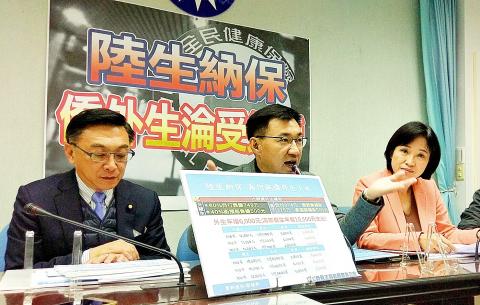The Chinese Nationalist Party (KMT) caucus yesterday said that overseas compatriot students and foreign students are the “collateral damage” of President Tsai Ing-wen’s (蔡英文) policy of including Chinese students in the National Health Insurance (NHI) system, as they will have to payer higher contributions.
The president announced the proposals in late October, which would see Chinese students covered by the NHI scheme, but paying full premiums. The bill also removes 40 percent government subsidies on NHI premiums that are currently enjoyed by overseas compatriot students and foreign students.
The legislature’s Social Welfare and Environmental Hygiene Committee discussed the amendment at a meeting yesterday.

Photo: Fang Pin-chao, Taipei Times
KMT caucus secretary-general Johnny Chiang (江啟臣) said the decision would mean that overseas compatriot and foreign students would have to pay at least NT$500 more per month for NHI coverage.
Under current rules, foreign students pay about NT$750 per month, while overseas compatriot students pay less, as they enjoy subsidies from the Overseas Community Affairs Council, Chiang said.
KMT Legislators Ko Chih-en (柯志恩) and Alicia Wang (王育敏) said that as a lot of overseas compatriot students and foreign students come from Southeast Asia, the new policy would be a slap in the face to the government’s “new southbound policy.”
Invited by the KMT to share his view, Huang Chen-feng (黃振峰), a foreign student from Malaysia studying at Soochow University, said he might stop studying in Taiwan if he is required to pay NT$6,000 more per year.
“I would hope that public hearings could be held before a final decision is made. I’m worried that this proposal would be railroaded through just like the labor law amendments were,” he said.
Chinese student Huang Luo yu (黃洛羽) said that as most Chinese students pay NT$500 per month for private insurance, he did not “see why we have to join the NHI if it is much more expensive.”
“Chinese students cannot even take part-time jobs here,” she said, adding that Taiwan has always been known as a place of friendliness and respect to human rights and she would hate to see that image fade among Chinese students.
Lin Nan (林楠), another Chinese student invited by the KMT caucus to the press conference, said he wondered why “Tsai Ing-wen displeases a group of people whenever she undertakes a reform.”
“It is OK if we do not benefit from subsidies, but a lower premium rate, befitting policyholders our age [who are less likely to use medical resources], would be better,” he said.
“No one has helped us understand the difference between the NHI and private insurance. The Mainland Affairs Council has not much to do right now, so it could tour schools to discuss the issue,” Lin said.

DEFENSE: The National Security Bureau promised to expand communication and intelligence cooperation with global partners and enhance its strategic analytical skills China has not only increased military exercises and “gray zone” tactics against Taiwan this year, but also continues to recruit military personnel for espionage, the National Security Bureau (NSB) said yesterday in a report to the Legislative Yuan. The bureau submitted the report ahead of NSB Director-General Tsai Ming-yen’s (蔡明彥) appearance before the Foreign and National Defense Committee today. Last year, the Chinese People’s Liberation Army (PLA) conducted “Joint Sword-2024A and B” military exercises targeting Taiwan and carried out 40 combat readiness patrols, the bureau said. In addition, Chinese military aircraft entered Taiwan’s airspace 3,070 times last year, up about

A magnitude 4.3 earthquake struck eastern Taiwan's Hualien County at 8:31am today, according to the Central Weather Administration (CWA). The epicenter of the temblor was located in Hualien County, about 70.3 kilometers south southwest of Hualien County Hall, at a depth of 23.2km, according to the administration. There were no immediate reports of damage resulting from the quake. The earthquake's intensity, which gauges the actual effect of a temblor, was highest in Taitung County, where it measured 3 on Taiwan's 7-tier intensity scale. The quake also measured an intensity of 2 in Hualien and Nantou counties, the CWA said.

The Overseas Community Affairs Council (OCAC) yesterday announced a fundraising campaign to support survivors of the magnitude 7.7 earthquake that struck Myanmar on March 28, with two prayer events scheduled in Taipei and Taichung later this week. “While initial rescue operations have concluded [in Myanmar], many survivors are now facing increasingly difficult living conditions,” OCAC Minister Hsu Chia-ching (徐佳青) told a news conference in Taipei. The fundraising campaign, which runs through May 31, is focused on supporting the reconstruction of damaged overseas compatriot schools, assisting students from Myanmar in Taiwan, and providing essential items, such as drinking water, food and medical supplies,

New Party Deputy Secretary-General You Chih-pin (游智彬) this morning went to the National Immigration Agency (NIA) to “turn himself in” after being notified that he had failed to provide proof of having renounced his Chinese household registration. He was one of more than 10,000 naturalized Taiwanese citizens from China who were informed by the NIA that their Taiwanese citizenship might be revoked if they fail to provide the proof in three months, people familiar with the matter said. You said he has proof that he had renounced his Chinese household registration and demanded the NIA provide proof that he still had Chinese